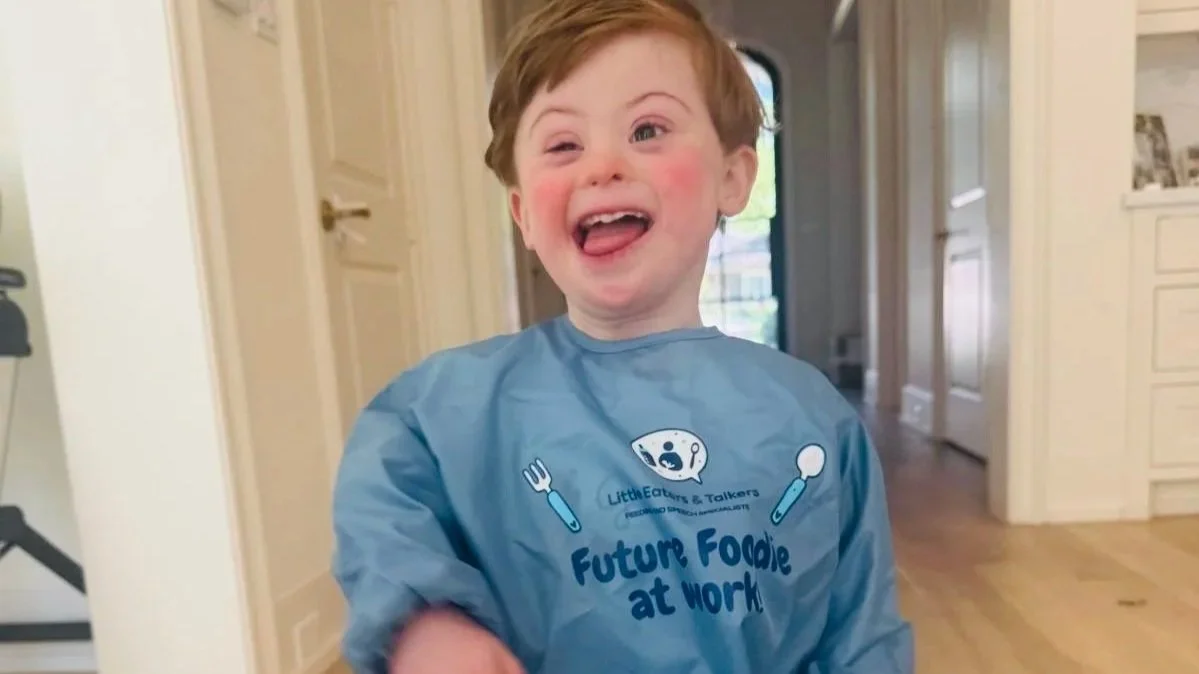Feeding Support for Infants and Children with Down Syndrome
October is Down Syndrome Awareness Month! Learn why feeding challenges are common for babies with Down syndrome, how early feeding therapy supports oral-motor skills, and why every bite matters on the journey toward joyful eating
Celebrating Strength and Connection
October is Down Syndrome Awareness Month — a time to celebrate the unique strengths, smiles, and milestones of children with Down syndrome. As a pediatric feeding and swallowing specialist, I’m continually inspired by the determination of these little ones and the devotion of their families.
Feeding, one of the earliest forms of bonding and communication, can also be one of the earliest challenges. Understanding why feeding can be more difficult — and how therapy helps — is the first step toward supporting healthy, happy mealtimes.
Why Feeding Can Be Challenging for Babies with Down Syndrome
Feeding challenges are common, but they are not inevitable or insurmountable. Babies with Down syndrome may face unique differences in their oral and overall development that influence how they eat and drink:
Low muscle tone (hypotonia): Weakened cheek, lip, and tongue muscles can make it harder to generate suction for breastfeeding or bottle feeding.
Oral-motor coordination: Difficulty coordinating suck–swallow–breathe patterns can lead to fatigue, coughing, or prolonged feeds.
Sensory differences: Some babies may have stronger gag responses or avoid certain textures, making transitions to solids slower.
Airway and structural differences: A smaller mouth, larger tongue, or high-arched palate can impact latch and breathing.
Medical factors: Conditions such as congenital heart defects or reflux can further affect endurance and appetite.
Research shows that up to 80% of infants with Down syndrome experience early feeding difficulties (Frazier & Friedman, 2021), and while breastfeeding initiation rates range from 60–80%, ongoing support from feeding specialists and lactation consultants can greatly improve success.
How Feeding Therapy Helps
Feeding therapy gives families practical tools and confidence. Early intervention focuses on strengthening oral-motor skills, improving coordination, and creating positive associations with feeding.
A comprehensive feeding plan may include:
Oral-motor stimulation to strengthen the lips, cheeks, and tongue.
Flow and pacing strategies to match the baby’s endurance.
Sensory exploration to build tolerance for new textures and tastes.
Adaptive supports such as specialized bottles, nipples, or seating for stability.
Caregiver coaching to empower parents to integrate strategies at home.
Feeding therapists often collaborate with occupational therapists, lactation consultants, and medical teams, ensuring the approach supports both nutrition and the family’s emotional well-being.
Supporting Breastfeeding in Down Syndrome
Breastfeeding offers immune, respiratory, and developmental benefits — and it’s possible for many babies with Down syndrome with the right support.
Common challenges include weak latch, low endurance, and fatigue, but individualized guidance makes a difference. Techniques such as side-lying positioning, nipple shields, or shorter, more frequent feeds can help babies maintain energy and coordination.
Studies show that early oral-motor stimulation programs (Spittle et al., 2021) improve readiness for breastfeeding, and continued breastfeeding after discharge supports long-term respiratory health and bonding (Crowe et al., 2022).
Transitioning to Solids: Slow and Steady Wins the Race
Introducing solids is an exciting milestone, but many babies with Down syndrome benefit from a slower, more sensory-rich approach.
Start with exploration — touching, smelling, and tasting — before expecting consistent intake. Support upright positioning and give extra time for chewing and swallowing.
Mealtime play, messy exploration, and repetition all build confidence and skill.
Remember: progress isn’t linear. What matters most is consistency, comfort, and positive connection at the table.
Empowering Caregivers
Behind every successful feeding journey is a dedicated caregiver learning, adapting, and cheering their child on. Feeding therapy is about more than exercises — it’s about building trust and joy around food.
Celebrate small wins: one new bite, one less gag, one longer feed. Every success matters.
As therapists, our role is to reassure parents that feeding success looks different for every child. Progress, not perfection, is the goal.
Resources and Support
If your baby with Down syndrome is experiencing feeding challenges, you’re not alone.
Little Eaters & Talkers offers in-home and virtual feeding therapy, lactation consultations, and developmental support throughout Houston and surrounding areas.
Additional trusted resources include:
National Down Syndrome Society (NDSS)
Down Syndrome Diagnosis Network (DSDN)
GiGi’s Playhouse
Every child deserves a safe, nurturing, and joyful feeding experience. This Down Syndrome Awareness Month, we celebrate the families who model patience, perseverance, and unconditional love — one bite, one sip, and one smile at a time.








